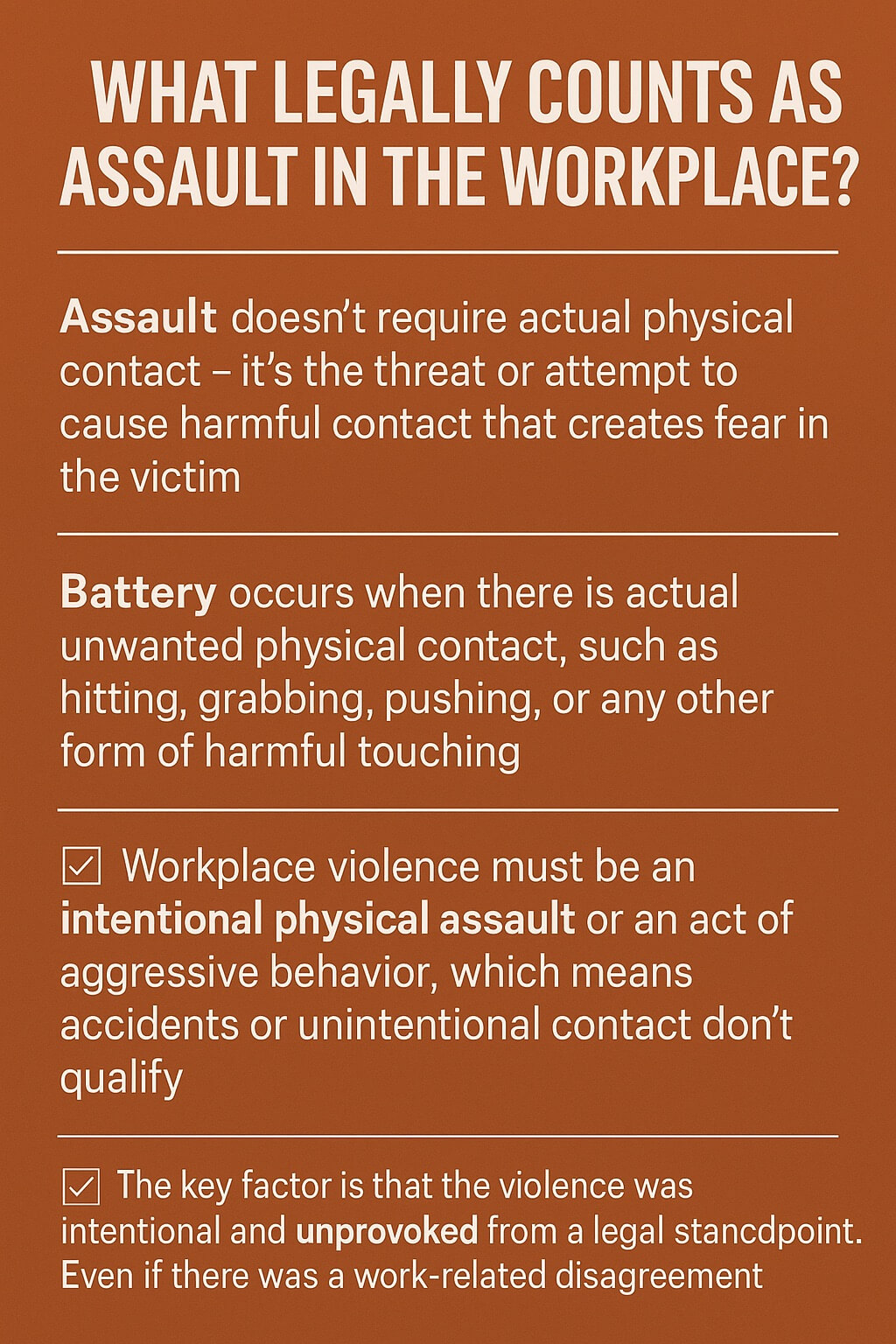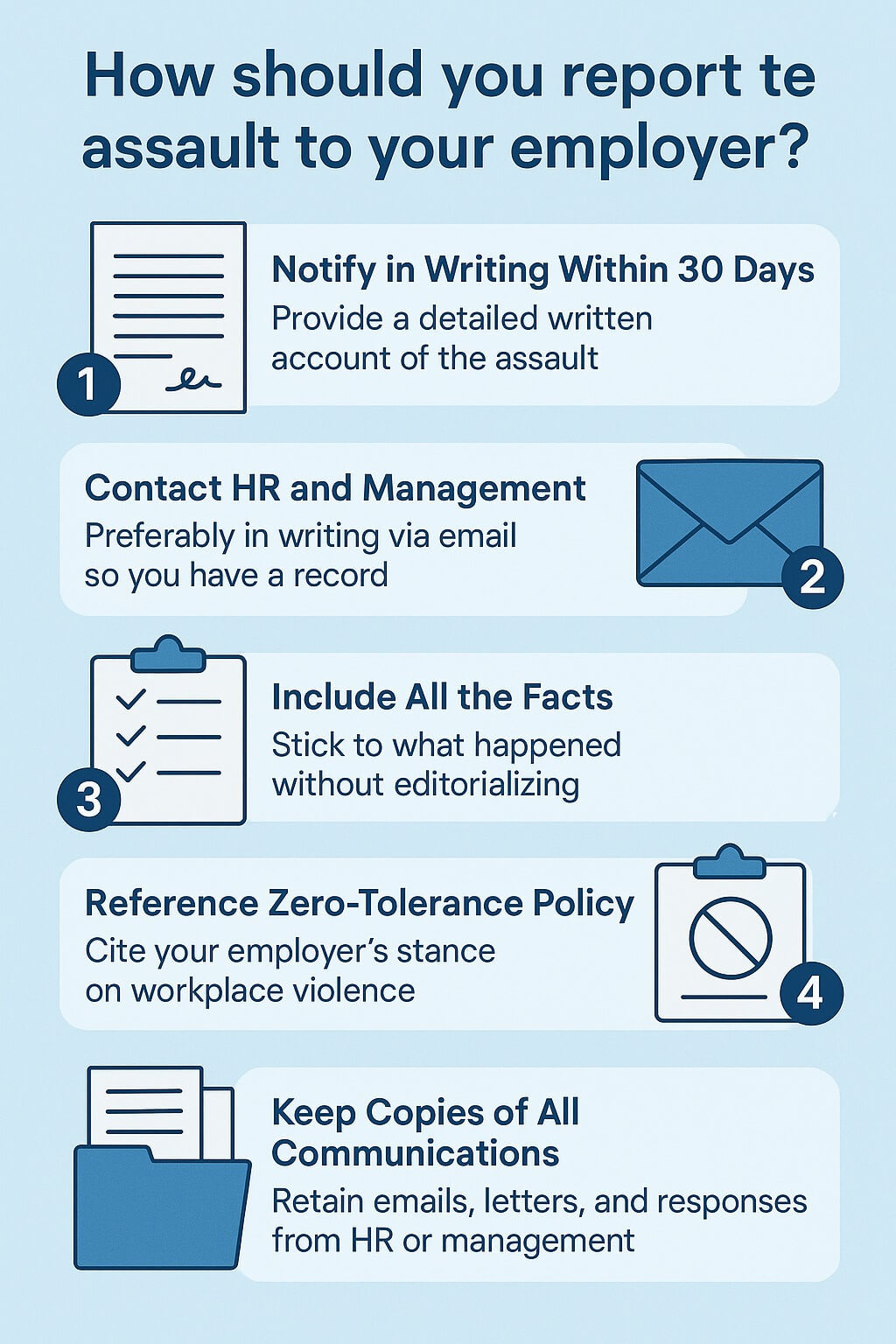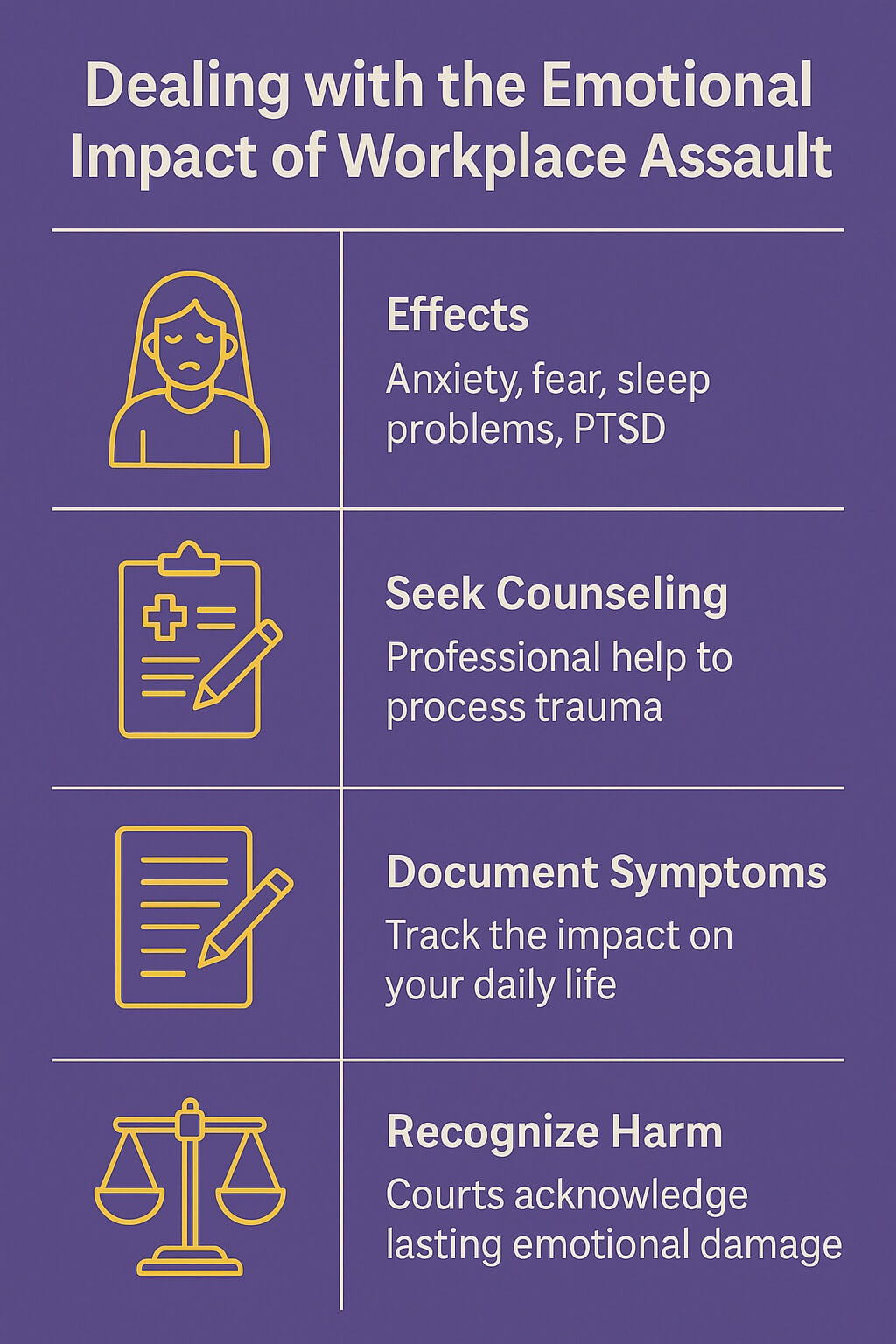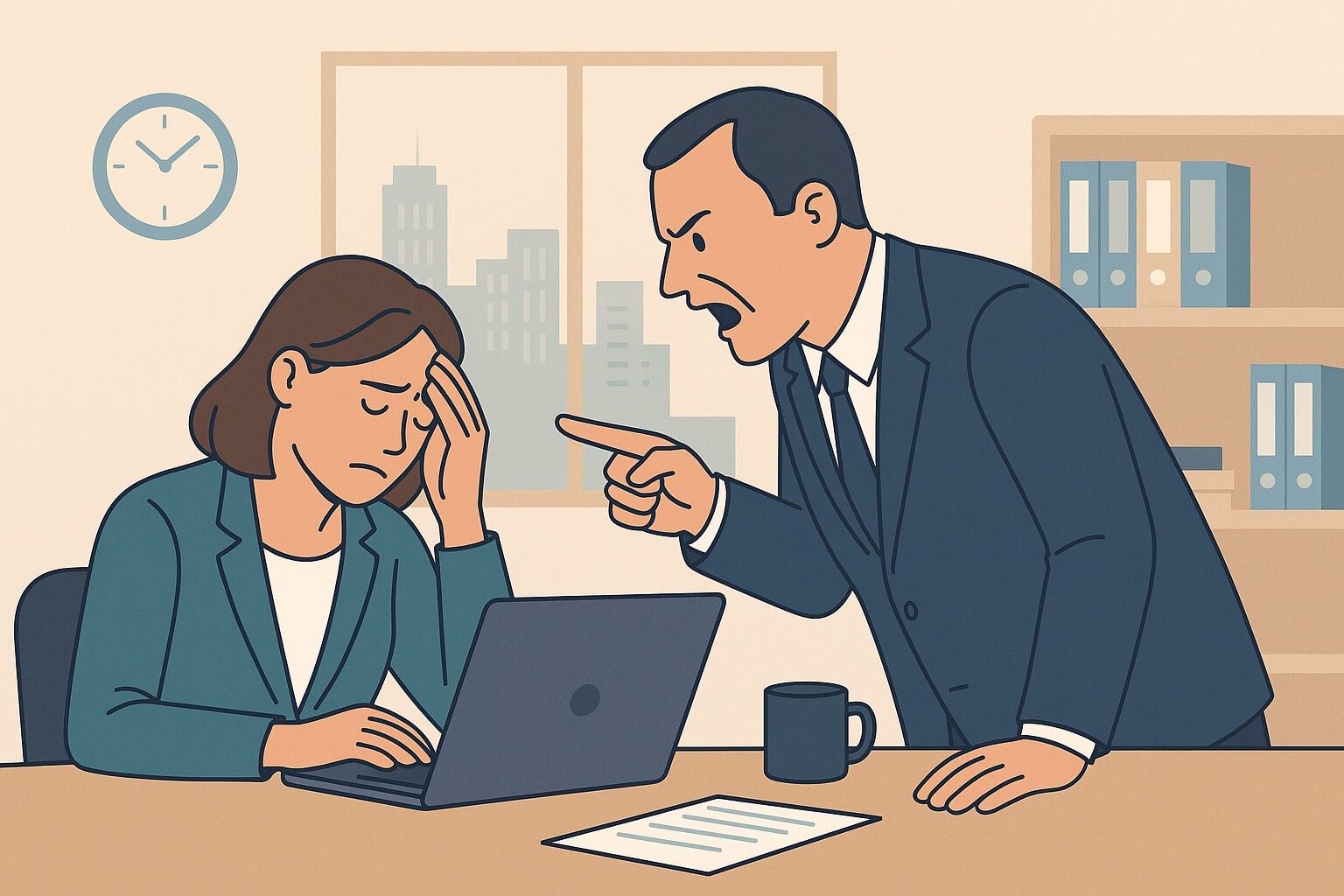Being physically attacked by a supervisor or manager at work is one of the most traumatic experiences an employee can face. This type of workplace violence not only causes physical harm but also creates severe emotional distress and can completely destroy your sense of safety at work. Understanding your legal rights and taking the proper steps immediately after an assault can protect you and help ensure justice is served.
Workplace assault by supervisors is more common than many people realize, often occurring when power dynamics, stress, and poor management combine in dangerous ways. Knowing how to respond can make the difference between getting the protection and compensation you deserve versus being further victimized by the system.
What legally counts as assault in the workplace?
Assault and battery sometimes happen in the workplace when there are fights between employees and supervisors or between two employees, but the legal definition is very specific. Assault doesn’t require actual physical contact – it’s the threat or attempt to cause harmful contact that creates fear in the victim.
Battery occurs when there is actual unwanted physical contact, such as hitting, grabbing, pushing, or any other form of harmful touching. When a supervisor physically attacks an employee, this typically involves both assault and battery charges.
Workplace violence must be an intentional physical assault or an act of aggressive behavior, which means accidents or unintentional contact don’t qualify. The attack must be deliberate and purposeful to meet the legal standards for workplace assault.
The key factor is that the violence was intentional and unprovoked from a legal standpoint. Even if there was a work-related disagreement beforehand, physical violence is never an acceptable response and always crosses legal boundaries.

Should you call the police immediately after a workplace assault?
Yes, contacting law enforcement should be your first priority after any workplace assault. Like any other physical violence, assault in the workplace is a crime, and you should immediately report it to law enforcement so they can arrest the person responsible.
Calling the police creates an official record of the incident and starts the criminal justice process. This police report becomes crucial evidence for any future legal proceedings, workers’ compensation claims, or civil lawsuits you may pursue.
When speaking with police, provide all the details you can remember about the incident, including exactly what led up to the assault, what happened during the attack, and any injuries you sustained. Be honest and thorough, but stick to the facts rather than speculation.
The police will likely arrest your supervisor if there’s evidence of assault, and the prosecutor’s office will decide whether to file criminal charges. This process happens separately from any workplace disciplinary actions or civil legal remedies you might pursue.
What kind of evidence should you gather right away?
Documentation is absolutely critical in workplace assault cases. Taking immediate action is crucial. Start by documenting every detail of the incident, including dates, times, locations, and the names of any witnesses. This thorough documentation will be invaluable when filing a report or claim.
Photograph your injuries as soon as possible and continue taking photos as they heal or change. These visual records provide powerful evidence of the assault’s impact and can be crucial in legal proceedings.
Collect as much information as possible about the assault. Document details such as: The date, time, and location of the assault. The individuals involved and any witnesses to the incident. The nature of your injuries and medical treatment you received.
Get witness statements in writing if possible. People’s memories fade over time, so having witnesses write down what they saw immediately after the incident preserves their testimony. Include their contact information in case they need to testify later.
Keep detailed records of all medical treatment you receive, including emergency room visits, doctor appointments, prescriptions, and therapy sessions. Medical records directly link your injuries to the workplace assault.
How should you report the assault to your employer?
Notify your employer in writing within 30 days of the assault. Provide a detailed written account of the assault. That should include where, when, and how it happened, as well as the names of any witnesses. Then, keep a copy of this notification for your records.
Contact both Human Resources and upper management immediately, preferably in writing via email so you have a record. Even if you’ve already spoken to them by phone, follow up with written documentation of what was discussed.
Your written report should include all the facts about the incident without editorializing or including personal opinions. Stick to what happened, when it happened, who was involved, and what injuries you sustained.
One of the best protections is for employers to establish a zero-tolerance policy toward workplace violence. The policy should cover all workers, patients, clients, visitors, contractors, and anyone else who may come in contact with employees. If your employer has such a policy, reference it in your report and expect them to follow it.
Keep copies of all communications with your employer about the incident. This includes emails, letters, meeting notes, and any responses you receive from HR or management.

Are you eligible for workers’ compensation after a workplace assault?
Yes, workplace assaults typically qualify for workers’ compensation benefits, even when the attacker is your supervisor. You will also need a medical exam to prove your injuries, but it can be difficult to fully document them if you wait too long.
Workers’ compensation should cover your medical expenses related to the assault injuries, including emergency room treatment, ongoing medical care, therapy, and prescription medications. You may also be eligible for temporary disability payments if you can’t work due to your injuries.
Since state law requires that only workers who sustain injuries “arising out of and in the course of” employment are entitled to benefits, you may be required to establish that the assault was not prompted by a personal dispute or other non-work-related grievance.
The key is proving the assault was work-related rather than a personal dispute. If the attack stemmed from workplace disagreements, scheduling conflicts, or other job-related issues, it should qualify for workers’ compensation coverage.
Use thorough documentation: incident reports, medical records, photos, and witness statements. If your claim is denied, you have a right to appeal—consult an attorney experienced in assault-related claims.
Can you sue your employer for the supervisor’s assault?
In most cases, you can pursue a civil lawsuit against both your supervisor personally and potentially your employer, depending on the circumstances. This is separate from workers’ compensation and criminal charges.
You normally have three years to file a personal injury lawsuit. Unlike workers’ compensation claims, you must prove fault to recover compensation through a lawsuit. This requires strong evidence, making it all the more important to investigate your claim as soon as possible.
Your employer may be liable if they knew about the supervisor’s violent tendencies and failed to take action, if they failed to provide adequate security, or if they negligently hired or retained a dangerous employee.
A civil lawsuit can provide compensation for damages that workers’ compensation doesn’t cover, such as pain and suffering, emotional distress, punitive damages, and full wage replacement rather than the limited percentage workers’ compensation provides.
The evidence you gather immediately after the assault becomes crucial for proving your case in civil court. Strong documentation can lead to significant financial recovery beyond what workers’ compensation provides.
What if your employer retaliates against you for reporting?
Retaliation for reporting workplace assault is illegal and can result in additional legal claims against your employer. The employer is automatically liable for harassment by a supervisor that results in a negative employment action such as termination, failure to promote or hire, and loss of wages.
Common forms of retaliation include firing, demotion, reduction in hours, hostile treatment from other supervisors, or creating a hostile work environment. Document any changes in how you’re treated after reporting the assault.
If you experience retaliation, report it immediately to HR and consider filing a complaint with the Equal Employment Opportunity Commission (EEOC) or your state’s civil rights agency.
Retaliation claims can result in significant additional compensation and may strengthen your overall legal case against the employer. Courts and juries typically view retaliation very negatively.
Should you seek medical attention even for minor injuries?
Yes, seeking immediate medical attention is crucial even if your injuries seem minor. Some injuries from physical assaults don’t show symptoms immediately, and having medical documentation creates an official record linking your injuries to the workplace incident.
Keep detailed records of the assault, including any medical reports and correspondence with your employer regarding the incident. These documents will be important when filing your workers’ compensation claim.
Medical professionals can identify injuries you might not notice due to adrenaline or shock, such as concussions, internal injuries, or soft tissue damage. Early medical intervention can also prevent complications and speed your recovery.
Mental health treatment is equally important. Workplace assault often causes anxiety, depression, post-traumatic stress, and other psychological effects that qualify for treatment and compensation.
Keep all medical records, bills, and documentation of treatment recommendations. These records support both your workers’ compensation claim and any civil lawsuit you might pursue.
How do you deal with the emotional impact of workplace assault?
The psychological effects of being assaulted by a supervisor can be severe and long-lasting. Many victims experience anxiety about returning to work, fear of authority figures, sleep problems, and symptoms of post-traumatic stress disorder.
Consider seeking professional counseling or therapy to help process the trauma. Many therapists specialize in workplace trauma and can provide strategies for coping with the emotional aftermath.
Document your emotional symptoms and how they affect your daily life and work performance. This information supports claims for emotional distress damages in civil lawsuits.
Don’t minimize the psychological impact just because the physical injuries have healed. Courts recognize that workplace assault can cause lasting emotional harm that deserves compensation.

What happens if witnesses are afraid to come forward?
Witness intimidation is unfortunately common in workplace assault cases, especially when the attacker holds a supervisory position. Some witnesses may fear retaliation or job loss for providing testimony against a manager.
Remind witnesses that retaliation against them for providing truthful testimony is illegal and could result in additional legal claims. Their cooperation helps protect not only you but also future employees.
If witnesses are reluctant to provide formal statements, ask if they would be willing to speak confidentially with investigators or attorneys. Sometimes witnesses are more comfortable providing information privately than in public proceedings.
Consider whether there might be security camera footage or other electronic evidence that could substitute for hesitant witnesses. Many workplaces have surveillance systems that may have captured the incident.
When should you hire an attorney?
Consider consulting with an attorney as soon as possible after a workplace assault. Many personal injury attorneys offer free consultations and can help you understand your legal options without upfront costs.
An attorney can help you navigate the complex interactions between criminal charges, workers’ compensation claims, and civil lawsuits. They can also ensure you meet all deadlines and don’t accidentally waive important rights.
If your workers’ compensation claim is denied or disputed, legal representation becomes essential. Insurance companies often try to minimize payouts, but an experienced attorney can fight for full benefits.
Don’t give up if your employer denies your workers’ comp claim. An attorney can help you appeal the denial and gather additional evidence to support your case.
What can you expect from the legal process?
The legal process following workplace assault typically involves multiple parallel proceedings: criminal charges against your attacker, workers’ compensation claims, and potentially civil lawsuits.
Criminal proceedings move at their own pace and are controlled by prosecutors. Your role is primarily as a witness, though you may have input on plea agreements or sentencing.
Workers’ compensation claims usually resolve more quickly than civil lawsuits, often within months rather than years. The focus is on getting your medical bills paid and providing wage replacement during recovery.
Civil lawsuits take longer but offer the potential for greater compensation. These cases can take 1-3 years to resolve, depending on the complexity and whether they go to trial.
How can you protect yourself when returning to work?
If you return to work after a workplace assault, your safety should be the top priority. Insist that your employer implement safety measures such as removing the attacker from supervisory positions or ensuring you don’t work alone with potentially violent individuals.
Request transfers to different departments or locations if necessary to avoid contact with your attacker. Most employers will accommodate reasonable safety requests to avoid liability.
Document any safety concerns or incidents that occur after your return. If your employer fails to provide adequate protection, this can support additional legal claims.
Consider whether returning to the same workplace is truly safe for you. Sometimes the best option is finding new employment and seeking compensation for lost wages and job search expenses.
Making the decision to take legal action
Workplace assault is a serious crime that deserves serious consequences. Taking legal action not only protects your own rights but also helps prevent similar attacks on other employees in the future.
The combination of criminal charges, workers’ compensation, and civil litigation provides multiple avenues for justice and compensation. Each serves a different purpose: criminal charges punish the attacker, workers’ compensation covers immediate medical needs, and civil lawsuits provide full compensation for all damages.
Don’t let fear of retaliation or concerns about “making trouble” prevent you from seeking justice. You have the right to a safe workplace, and employers have a legal obligation to protect their employees from violence.
The trauma of workplace assault can feel overwhelming, but remember that you have legal rights and resources available to help you recover and move forward. Taking proper legal action is not just about getting compensation – it’s about holding people accountable and preventing future violence in your workplace.
